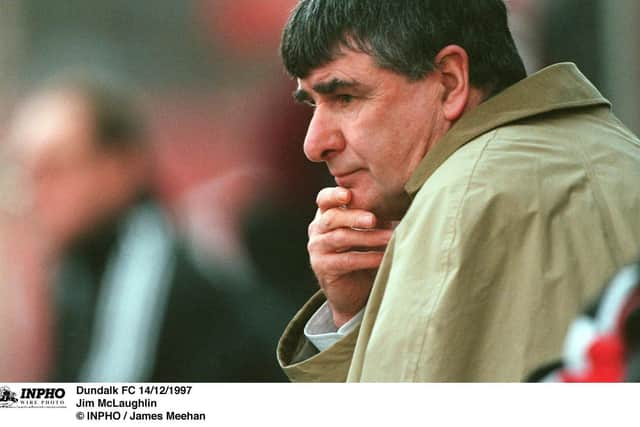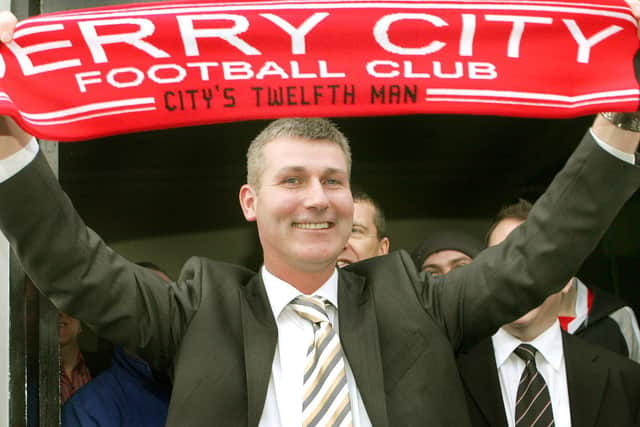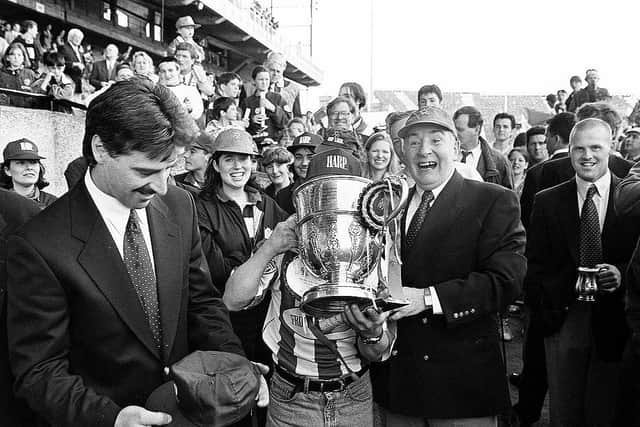The Derry City Plan: A look at the Candy Stripes' managerial trends
and live on Freeview channel 276
However, an in-depth analysis of the club’s success and failures over the past three decades has shown that changing managers hasn’t always been the answer.
‘It’s not about changing people: it’s sometimes about changing a situation’: a quote from Liverpool boss Jurgen Klopp that sums up nicely the message former assistant manager Hugh Harkin intended to put to the Derry City Board at the ‘Come to Jesus’ meetings at the end of the 2020 campaign.
Advertisement
Hide AdAdvertisement
Hide AdThe well-worn cliche; ‘insanity is doing the same thing over and over and expecting different results’ rings true for Derry but after years of ‘crisis management’ it’s time for a radical change of approach in an attempt to improve both the on and off field performances.
Ironically the first of those changes was replacing the manager but the appointment of Ruaidhri Higgins on a long term deal is considered a fresh start for the implementation of an ambitious three year plan.
Some of the trends highlighted in the report may come as a surprise to some but the overall findings suggest a disconnect between the club’s vision and how some managers went about achieving it. Indeed, what the directors considered a success may differ from what the manager feels he has achieved given the resources available.
Continual managerial changes wastes money! And the fact the Candy Stripes have finished almost as often in the bottom half of the league as the top half would add weight to the fact that changing the manager hasn’t always produced the desired results.
Advertisement
Hide AdAdvertisement
Hide Ad“Of course there are occasions when replacing the manager is a must but the main thing that clubs miss is to have a proper long term strategy in place before appointing the new manager as without this there will be the usual merry go round,” offers Harkin’s report.


With this long term plan now firmly in place and new policies introduced, Higgins has been charged with challenging for the title or potentially bringing it home to Foyleside for the first time since 1997!
So what’s worked in the past?
While Derry has a rich tradition in cup competitions, the league is the ultimate prize for any football club and provides a better overall insight into a club’s performance over the course of a season. From 1985 to 2019 there have been 16 different incumbents of the Brandywell hotseat with seven locals and nine from outside the city.
From entering the league in ‘85 and not including their stints in the First Division, Derry have been competing in the Premier Division for 32 years up until 2019. The 2020 season was also omitted from the data due to the Covid pandemic and shortened fixture schedule.


Advertisement
Hide AdAdvertisement
Hide AdManagers who took over for an interim period following the sacking of a manager, were also discounted and therefore the report focussed on only those who competed in the top division - two of which (Stephen Kenny and Declan Devine) have had two spells.
The most successful of these managers were in the earlier years with Brandywell natives Jim McLaughlin and Felix Healy both winning the league.
The club’s other main period of success was under Stephen Kenny’s tenure when Derry finished runners-up twice in ‘05 and ‘06 before the Dubliner departed for Dunfermline in ‘07.
Local managers have a win rate percentage of 41% compared to non-local managers who have a win rate of 35%. (The win rate for each manager is calculated by dividing the number of games won by the number of games played in the league that season).


Advertisement
Hide AdAdvertisement
Hide AdOnly two managers in the club’s history have won the league title while success for others has been either winning a trophy or qualification for Europe.
Results on the pitch are, of course, a highly visible and an enduring performance indicator and pound for pound, the stats suggest Felix Healy, who brought the title to Brandywell in 1997, was the club’s most successful manager since its entry into the League of Ireland when taking into consideration the money spent!
Perhaps a surprise to Derry City fans given Jim McLaughlin’s historic, yet to be repeated ‘treble’ success with the famous ‘89 team and his 80% win percentage that year compared to Healy’s 72% during his title winning campaign.
“Of the other two successful managers Jim McLaughlin won the treble and made history,” continued the report. “This occurred in the early years when Derry were drawing huge crowds and had a steady income and resources but again the majority of this was used to secure the trophies.
Advertisement
Hide AdAdvertisement
Hide Ad“Felix Healy however secured the league title and was unlucky not to have won the double having finished runners up in the FAI Cup with a mostly local team on a fraction of the budget of (Stephen) Kenny or McLaughlin. It could be argued therefore that, pound for pound, Felix Healy is the most successful of all the managers since Derry’s return to football.”
Current Ireland boss Kenny has enjoyed the longest spell as manager having taken charge for six seasons over two spells while Kevin Mahon has the longest unbroken tenure with five seasons!
Alarmingly half of the managers were only there for one season (Noel King, Tony O’Doherty, Roddy Collins, Dermot Keely, Pat Fenlon, Neil Robertson, Gavin Dykes, and Peter Hutton).
The report also shows the majority of managers that stayed longer than a year enjoyed a bounce in their first season. This was usually followed by a slump in form during the second season before ultimately losing their job. This would demonstrate the nervousness of the club about losing its top flight status or not meeting European aspirations.
Advertisement
Hide AdAdvertisement
Hide AdDerry have finished in the top half of the league 17 times with 15 finishes in the bottom half during the period under study. These figures correlate with the duration and length of time the managers stay in their posts. With the average tenure around two seasons, the first season being a top half finish and the second a bottom half finish with the same pattern playing out time and again.
Having learned the lessons from previous managerial tenures and informed by Harkin’s report, Higgins is now tasked with taking the club forward during his three and a half year stint. Considered a transitional year in 2021, the Limavady man will be expected to ‘create a proper environment for the club to thrive’, put proper recruitment in place and build the nucleus of his team.
The Board believe they have the right people in place to make the club competitive and self sustainable over that short timeframe with major changes both on and off the pitch.
By year three of his contract, the ambition is to finish in the top three in the league and challenge the leaders for trophies and potentially the league title itself.
Advertisement
Hide AdAdvertisement
Hide AdWith a more sensible use of club resources, proper recruitment and the right structures in place, there is renewed optimism among fans, players and certainly among the Board of Directors who believe patience will be rewarded with long term success.
Comment Guidelines
National World encourages reader discussion on our stories. User feedback, insights and back-and-forth exchanges add a rich layer of context to reporting. Please review our Community Guidelines before commenting.